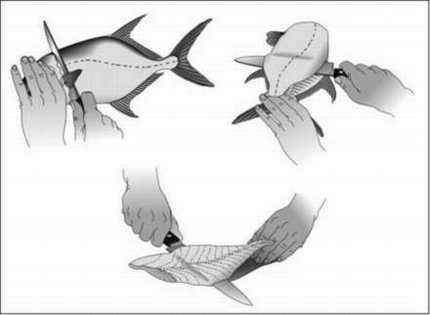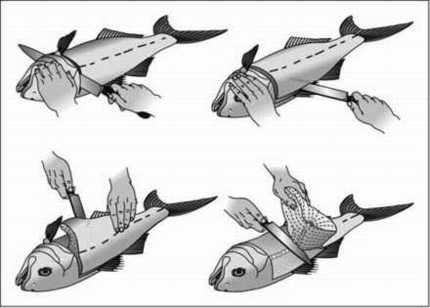It takes a certain amount of touch to fillet a fish, but expending a little more effort at the cleaning stage is worth it because it means no bones at the eating stage. When you get the hang of filleting, you can zip through a pile of fish pretty quickly, and it gives you a sense of accomplishment that you can do something as well as the old-timers.
Don't worry too much if you don't get absolutely all the meat off the fish when you first start filleting. The idea at the beginning is to get some. If you skin the fish, as recommended, you do not have to scale it first. Obviously, if you are going to use the skin, scale it unless you like to eat scales. Figure 1 shows the basics of filleting a small fish (up to about 5 pounds).
 |
Figure 1: Filleting a small fish. |
1. Cut off the head just behind the gills.
2. Hold the fish by the tail. With the knife blade pointing away from you and across the body of the fish, begin to cut toward the head (or at least where the head used to be). Use the backbone to guide your knife.
3. To take the skin off, begin by holding the fillet by the tail, skin side down.
4. Hold the knife crosswise across the fillet and insert the knife between the skin and the flesh. Don't worry if you don't get this perfect at first.
5. While holding the skin, cut in the direction of where the head used to be.
When you have a larger fish, the tail-to-head method of filleting can be a little awkward. In this case opening the fish like a book is an effective method, as shown in Figure 2.
 |
Figure 2: Try this technique for filleting larger fish. |
Follow these steps (shown in Figure 2) to fillet a larger fish:
1. Make a deep cut just behind the gills (about halfway through the thickness of the fish).
2. Cut a slit a few inches in length along the top of the fish (the dorsal side).
3. Using the tip of the knife, separate the flesh from the bones, as illustrated. The fish should open up just like a book.
4. When completely open, finish cutting away the fillet by moving the knife along the "spine of the book."




